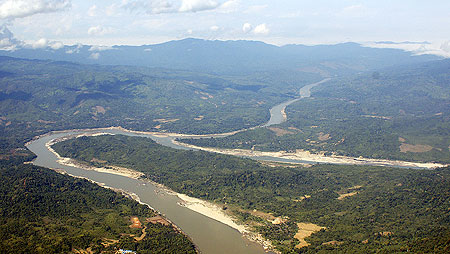
In this photo taken on Dec. 7, 2009, the Irrawaddy River runs through Kachin State, northern Burma. The country's President Thein Sein called Friday, Sept. 30, 2011 for a halt to construction of a controversial Chinese-backed hydroelectric dam on the river in the state (Photo: Khin Maung Win / AP)
The Irrawaddy River is the lifeblood of Burma. Its waters spring from the Myitsone confluence of two rivers in the country’s northern Kachin state, a largely Christian ethnic minority territory whose rebel militia has over the decades battled the Burmese military. A few years ago when Burma’s ruling junta agreed to a $3.6 billion, Chinese-backed dam that would flood a vast area near the Irrawaddy’s sacred source, few were surprised—even if many Burmese privately grumbled over a deal that would displace 15,000 people and put a potentially dangerous dam in a geologically unstable area. The ethnic Kachin haven’t exactly figured as a high priority for the country’s Buddhist, ethnically Burman generals. And Beijing—which was to enjoy most of the future electricity that would be sent from Myitsone to neighboring Yunnan Province in China—boasted the hard currency Burma’s regime needed to reinvigorate its local economy.
But on Sept. 30, Burmese local press reported that President Thein Sein, head of a quasi-civilian government that took office earlier this year, had sent a letter to the rubber-stamp parliament announcing the controversial dam would be suspended. Thein Sein’s letter addressed 10 points, including environmental and social concerns, according to at least three Burmese publications. (The fact that Thein Sein’s letter was reported in the country’s heavily censored and controlled media makes it likely that the suspension is genuine.) The announcement shocked many Burma-watchers, who have rarely witnessed Burmese government officials hew to public opinion, much less environmental and ethnic concerns.
But last November, Burma’s junta held stage-managed elections that shepherded in what was trumpeted as a new civilian government in March. Members of the military or its proxies still control most top posts, and Thein Sein himself is a retired general who was the junta’s No. 2. Nevertheless, recent weeks have witnessed a rare political opening in Burma—and the Myitsone has served as a kind of fulcrum of various political forces. First, internal cabinet sparring over the project surfaced. While Minister for Electric Power Zaw Min vowed that the dam would be built despite any public disapproval, Minister for Environmental Conservation and Forestry Win Tun urged decision-makers at a government conference on the dam to be “cautious,” according to the Myanmar Times, a partially government-controlled paper. Soe Thein, Minister for Industry 1 and 2, was also quoted by the Myanmar Times questioning whether the project served “the national interest.”
Then opposition leader Aung San Suu Kyi, who was released from house arrest late last year, lent her support to a grass-roots “Save the Irrawaddy” coalition. In September, the Nobel Peace Prize laureate attended an anti-dam art exhibition in commercial capital Rangoon without any official harassment. Earlier this week, some of the protesters who were marking the fourth anniversary of the bloody junta crackdown on monk-led rallies wore T-shirts criticizing the Myitsone dam. Unusually they were not arrested, although another person who had staged an earlier one-man demonstration in front of a Chinese government office was detained.
The question now is what the suspension will mean for relations between Burma, also known as Myanmar, and its main political ally, China. Western sanctions on Burma, which are tied to the country’s poor human-rights record, have been rendered largely moot because of Asian investment. Chief among Burma’s foreign investors is Beijing, which has poured money into hydropower, mining and a massive oil pipeline across Burma to Yunnan that would allow China to avoid the Strait of Malacca chokepoint through which much of its oil must currently pass.
The cozy relationship between Burma and China is relatively recent. For decades, ethnic rebels in Burma’s north, including some Kachin fighters, were funded by Chinese communists just across the border. Consequently, anti-Chinese sentiment still runs deep in Burma; anti-Chinese riots erupted in the late 1960s. Still it’s hard to ignore a neighbor eager to cash up a lonely regime in exchange for natural resources. Last year, roughly 40% of foreign investment in Burma came courtesy of China.
When I visited Myitsone in 2008, I met ethnic Kachin (also known as Jinghpaw) who were united in their opposition to the project. I also spoke with Chinese engineers who had worked on China’s controversial Three Gorges dam—and who were mystified by Kachin resentment. One Chinese manager told me: “In China, we just build the dams and people have to move. It’s for the good of the country’s development.” The question was implicit: Wasn’t Burma also run by an authoritarian government that could compel people to do what it wanted? What was the big hold-up?
Since that time, mysterious bombs, some fatal, unnerved Chinese workers at the Myitsone site. The unstable security situation meant that Chinese laborers would often leave for weeks at a time, and the project fell behind schedule. (The project’s Burmese partner was not Kachin, further fueling local resentment.) Meanwhile, relations between the Burmese junta and the rebel Kachin Independence Army, which controls turf around Myitsone, degenerated. The two sides are currently engaged in fierce firefights, after a 17-year ceasefire crumbled.
All in all, it was hardly the most stable working environment for Chinese dam workers. In fact, a leaked internal document appears to indicate that the Chinese wanted to pull out of the project, despite the promise of electricity for Yunnan. Now with the Burmese President’s remarkable announcement to parliament, the secret wishes of the Chinese may have just come true.

